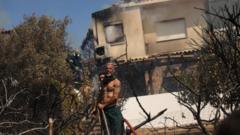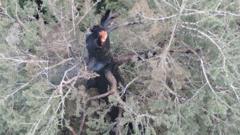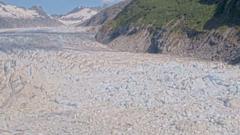A severe wildfire has devastated coastal areas near Athens, particularly the towns of Palaia Fokaia and Thymari, where flames rapidly advanced into residential zones, resulting in the destruction of at least 20 homes. The fire initially ignited in low vegetation but quickly escalated, exacerbated by temperatures reaching 40°C and strong winds, making firefighting efforts extremely challenging.
Local communities banded together with firefighters, forest rangers, and aerial support to battle the advancing flames. The coast guard also joined the efforts to protect the coastline. Emergency alerts were issued via Greece's 112 system, prompting urgent evacuations across several affected towns and villages as authorities struggled to contain the fire's spread.
Despite the clear danger, some residents opted to remain, attempting to safeguard their homes with hoses and improvised means. This decision drew warnings from officials, emphasizing the jeopardy posed to their lives and the impediments to emergency efforts. Local authorities reported that over 1,000 individuals were evacuated from threatened areas, while eleven tourists were rescued from a beach after being trapped as the fire approached.
Describing the situation as dire, local leaders opened public facilities for those in need of shelter or medical assistance. The head of Greece’s fire service announced the deployment of a specialized arson investigation unit to determine the fire's cause, with reports suggesting it could be linked to human activity.
With the prospect of further wildfires looming, a report from Greece's Risk Assessment Committee forecasts dangerously high temperatures, signaling heightened fire risks in Attica, Evia, the Peloponnese, and the northern Aegean regions in the days ahead. Emergency services remain on high alert as the effects of climate change continue to amplify wildfire risks across Greece.





















